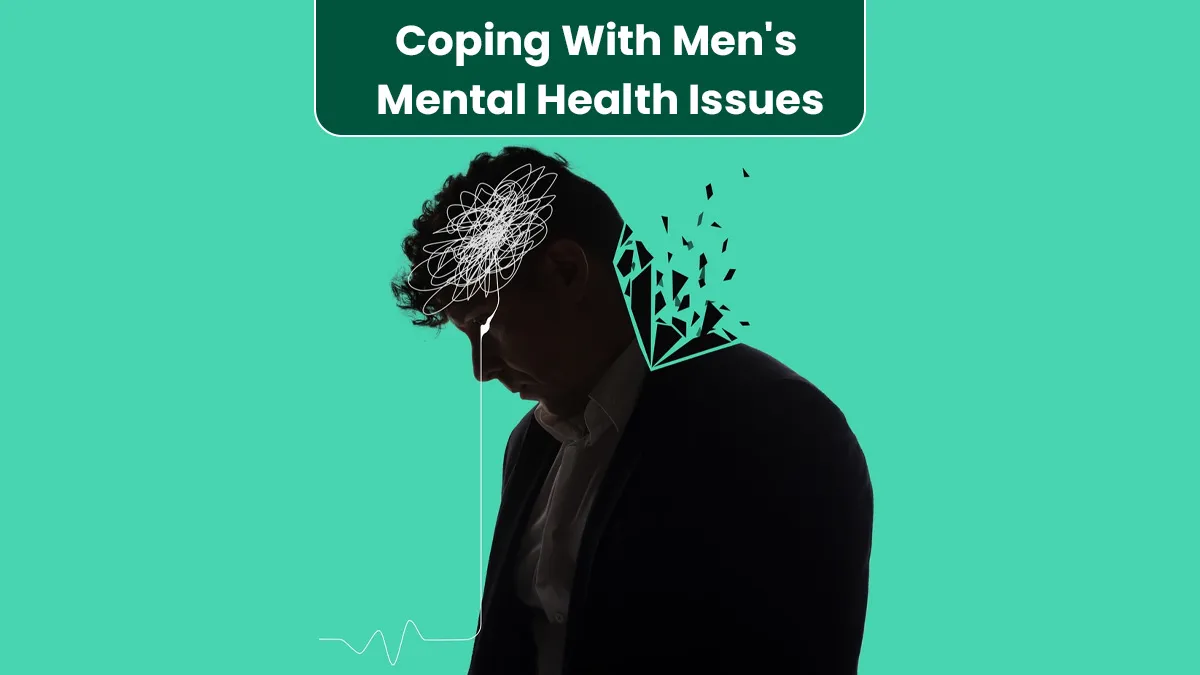
Multiple cases have recently come to the limelight where men have committed suicide due to life challenges. The tragic suicide of Manav Sharma, a 30-year-old IT professional from Mumbai, has casted light on the often-overlooked mental health struggles faced by men. Before taking his life, Manav recorded a poignant video expressing profound loneliness and highlighting the societal pressures that discourage men from seeking help. His plea, "Please, someone should talk about men. They become very lonely," resonates deeply, underscoring the urgent need to address men's mental health issues and the societal norms that compel them to suffer in silence.
Table of Content:-
CHECK YOUR
MENTAL HEALTH

To understand the coping mechanisms, we spoke to our experts Aarti Chawla, a Mumbai-based Relationship Psychotherapist and Life Coach and Priyanka Kapoor, Psychotherapist, Psychologist, Sex Therapist, Couple and Family Counsellor, Mumbai. They shared insights on how men can address their mental health challenges and seek the help they need in men.
How Can Men Cope With Mental Health Issues?
Acknowledge the Issue

Acknowledgement is the first step towards change. In our patriarchal society, boys are often told 'Don't cry like girls' or 'Men shouldn't feel pain (mard ko dard nahin hota)'. "This conditioning leads men to suppress their emotions. However, recognising that men are also human and that it's okay to be emotional is crucial. Once they acknowledge this, half the work is done," said Chawla.
It is common for men to be pressured to 'man up' and deal with issues on their own instead of seeking help. However, remember, mental health issues are common and don't signify weakness. "Allow yourself to acknowledge and express your emotions without repression. Whether it's work pressure, family dynamics, or financial stress, recognising the pressure or stress makes it easier to ask for help," said Kapoor.
Address the Problem
Once the issue is acknowledged, the next step is to address it. There are two ways to address the problem. One approach focuses on managing the emotional distress it causes to prevent it from affecting mental health. The other approach involves solving the issue itself.
For example, consider someone who has problems with a demanding colleague at work, causing significant stress and anger. This anger also impacts their mental and physical health, as well as their relationships. "Their priority should be to work on emotional regulation, becoming resilient so that the situation bothers them less, allowing them to make rational decisions. The second step is finding a solution, such as escalating the issue to their supervisor or exploring job opportunities. Either way, they must be mentally strong and confront the situation," suggested Chawla.
Also Read: How To Avoid Spiraling Thoughts, Expert Explains
Seek Help From Those Around You

Asking for help from those around you is the most important part of the process. You can start by talking to your family members and seeking their support, which can come in many forms. Sometimes, simply having them present and offering words of affirmation can be incredibly helpful. "For instance, in the case of Manav Sharma, having the support of his parents and siblings could have made a significant difference, and he may not have felt compelled to take his own life. Someone needed to remind him that a wrong relationship is not the end; life is still beyond it," added Chawla.
Seek Professional Help
When you feel that your family members are also unable to provide the support you need, it's best to seek professional help. You can connect to a counsellor or life coach for guidance on managing the situation. Even consulting a marriage counsellor can be beneficial. Ultimately, it's not about being right or wrong, but about doing what's right for you.
Overcome Emotional Suppression

Traditionally, men are problem-solvers and providers, excelling in analytical and logical skills. However, they often struggle with emotional understanding. Men are discouraged from expressing emotions like grief, fear, or anxiety, leading to suppressed feelings and unhealthy coping mechanisms.
To overcome this, practice mindfulness through journaling, thought logs, and open conversations with loved ones. "Consider joining a men's support group or seeking counselling/therapy for guidance and coping strategies. If necessary, medication under psychiatric supervision can be an option. Develop healthy habits by engaging in breathing techniques, meditation, or mindfulness. Participate in enjoyable activities that bring relaxation and joy," advised Kapoor.
Take Help To Quit Addiction
Sometimes, people tend to be dismissive about addiction, leading to delayed action. Regular substance use can impair judgment and increase vulnerability to suicidal thoughts. In some cases, intoxication may play a role in impulsive decisions, pushing individuals toward extreme actions.
Focus On Healthy Lifestyle

Maintaining a healthy lifestyle, including regular exercise or sports, is essential for men over 40. This helps them monitor their vital signs and overall well-being. A 2023 study found that physical activity improves sleep quality and benefits several psychiatric conditions. Exercise is also linked to enhanced mood and quality of life. Men can better support their mental health by prioritising physical health.
Recognise Mental Health Issues
Mental health issues are often mistakenly linked to failure or weakness, causing men to avoid seeking help due to fear of criticism. It's essential to acknowledge your feelings without worrying about judgment. Admitting to mental health issues can feel like losing control or disappointing others, said Kapoor.
However, it's crucial to recognise that mental health is just as important as physical health. There is no doubt that mental health problems are common, and they can occur for any number of reasons, such as overwhelming emotions, unresolved issues, or relationship problems. Ignoring these issues can exacerbate the situation, making it essential to recognise and address them.
Bottomline
Kapoor concluded, "Mental health concerns remain stigmatised in some societies, particularly among older generations. Seeking help may be perceived as unnecessary or a sign of weakness. Recognise that asking for help and expressing emotions takes courage. Challenge outdated notions that associate emotional repression with masculinity. Break down complex issues into manageable tasks. Prioritise progress over perfection. Regular exercise, such as jogging, weightlifting, or sports, boosts mood and reduces stress."
[Disclaimer: This article contains information provided by an expert and is for informational purposes only. Hence, we advise you to consult your professional if you are dealing with any health issue to avoid complications.]
Read Next
Supporting Your Child Through Board Exam Anxiety? Here's How To Support Their Mental Well-Being
How we keep this article up to date:
We work with experts and keep a close eye on the latest in health and wellness. Whenever there is a new research or helpful information, we update our articles with accurate and useful advice.
Current Version